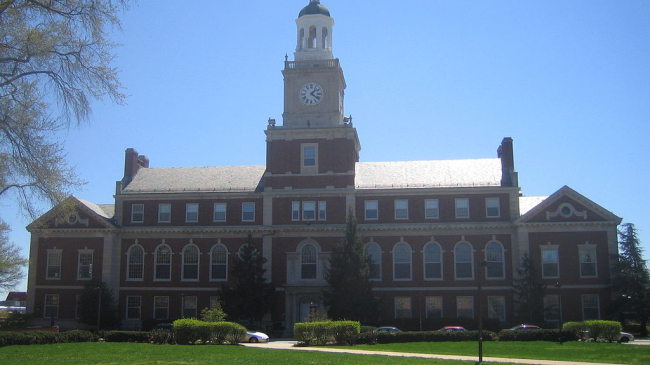The Summer Institute for Climate Change Education helps teachers address climate change education using an interdisciplinary approach, beyond the physical and natural sciences. Climate Generation offsite link, The Wild Center offsite link, NOAA’s Climate Program Office, and a wide range of partners are introducing the 2020 workshop as the “Stay-In-stitute offsite link” — a virtual conference that will take the place of an in-person event this year.

NOAA, Climate Generation, The Wild Center, and a wide range of partners are introducing the 2020 Summer Institute for Climate Change Education workshop as the “Stay-In-stitute” — a virtual conference that will take the place of an in-person event this year. (Image credit: NOAA)
Educators from around the country will gather virtually for a three-day experience that builds on a successful teacher-led, climate-focused humanities curriculum developed by a school in Washington, D.C. The Stay-In-stitute will take place from July 22-24, 2020, featuring two keynote speakers — Dr. Katherine Hayhoe offsite link and Kelisa Wing offsite link — and over 50 workshops and virtual experiences nested under five tracks that explore the fundamental best practices of climate change education:
- Science and other ways of knowing
- Personal connection and storytelling
- Breaking down structural racism and inequities
- Scientific and social solutions
- Supporting youth leaders
Register by July 13 to reserve your spot, and read on for a look at last year's in-person workshop to learn how Climate Generation, The Wild Center, NOAA, and partners approached climate change education in a whole new way.
A look back at the 2019 Summer Institute for Climate Change Education
Climate change is an interdisciplinary problem. From economics to geopolitics, chemistry to social sciences, the many factors that shape Earth’s climate could span an entire school curriculum. But climate change is nearly always taught in the context of science.
In summer 2019, the NOAA Climate Program Office partnered with the nonprofit Climate Generation to host their 14th annual Summer Institute for Climate Change Education at the Lowell School in Washington, D.C. This multi-day professional development opportunity provided 35 teachers from eight states resources to integrate climate change education into humanities and social sciences curricula.

The 2019 Summer Institute expanded a model that teachers at the Lowell School, a preK-8, private nonprofit, had developed to strengthen their students’ climate literacy.
“Lowell is committed to preparing students to be leaders in the 21st century,” said Natalie Stapert, a teacher at Lowell School. “We couldn't do that without direct, explicit, sustained instruction on the biggest threat to life on earth: climate change.”
Lowell reached out to Climate Generation, who brought in NOAA and other partners to create a support network. The result was a new, integrated social studies and language arts class for sixth graders called Humanities, which devoted an entire school year to the study of climate change, its impact on people around the world, and the many varied responses to the climate change challenge.
In the Humanities curriculum, Lowell students engaged in climate-based reading assignments, including young adult literature. They wrote their own dystopian climate fiction, prepared research reports, and composed persuasive letters about climate change. They investigated the economic impact of fossil fuels and the transition to renewable energy sources. Students gathered data using long-wave and short-wave infrared cameras to evaluate energy use and waste within their school building. A team of fifteen students became climate educators themselves, staffing a booth alongside experts from NASA, NOAA, and Howard University at the 2019 AAAS Family Science Days.
Overall, the new and improved Humanities curriculum was successful for both students and teachers. Students’ reading and writing levels improved. They were more likely to learn about climate change on their own time and discuss it with friends and family than the seventh or eighth graders who didn’t take the class.
“We always knew that, if this was successful, we needed to establish it as a model to bring it to other educators,” said Frank Niepold of NOAA’s Climate Program Office.
So in 2019, Lowell, Climate Generation, NOAA, and partners offered just such a workshop. The 2019 Summer Institute for Climate Change Education gave educators a range of resources to integrate climate change and solutions into reading, writing, history, civics, economics, geography, science, and technology. Offered in partnership with the American Geophysical Union, George Mason University’s Center for Climate Change Communication, and Project Drawdown, this multi-day professional development experience was a place where the issue of climate change was approached outside of a scientific lens.
During the workshop, educators learned skills that would help them empower their own students, from reading and writing climate stories to learning how to communicate data through art.

Across the board, teachers indicated that the Summer Institute helped them become more confident about teaching climate-related concepts. “I teach AP Environmental Science and felt that I had a good background on this subject, but only in the context of science,” said one participant. “Adding the humanities aspect was so impactful for me. I hope to use these resources with as many students in my school as possible to instill hope and action for climate change in their lives.”
This is the level of success that Climate Generation, The Wild Center, and NOAA are looking to produce in this year’s virtual conference.
“Climate change is a human issue,” said Niepold. “When it becomes personally relevant, teachers and students see changes happening in their lives, and when their own schools and communities can be seen as places for solutions, that is a powerful environment for learning to happen.”




